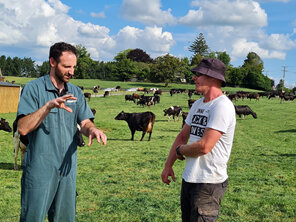
Trace minerals are recognised for the importance they play in ensuring healthy and productive livestock. Many formulations will maintain normal trace element levels but not all will provide enhancement of performance in herds with adequate mineral status.
Any trace mineral programme should prevent deficiency and maintain sufficiency. Organic minerals are the preferred option as they are protected against antagonists in the rumen and are consistently delivered to the small intestine for better absorption. The minerals that tend to have the greatest effect are those that are attached to essential amino acids. These are actively absorbed because the amino acid is essential to the animal. Absorption takes place in the intestine rather than the rumen where there are many products that can reduce absorption.
Many of the mineral formulations on the market can maintain mineral levels but few are able to provide (re)production enhancement.
In most situations cobalt and selenium are well-managed. Copper varies significantly between farms, districts, and seasons. Manganese, chromium, and zinc are all important, as is iodine, especially in cows that have wintered on brassica crops.
Not all will provide enhancement of performance in herds with adequate mineral status.
Studies have shown that injectable minerals with improved absorption characteristics can enhance reproductive performance by increasing pregnancy rates by 3-4% even in the face of sufficient mineral levels. The ideal time to give injectable minerals in chelate form is around 4 weeks before calving and 4 weeks before mating. Highly bioavailable trace minerals are now available as water soluble forms that can be added to Dosatron systems.
For more information about trace minerals to maintain normal levels and about those that enhance performance please talk to your VetEnt vet today.